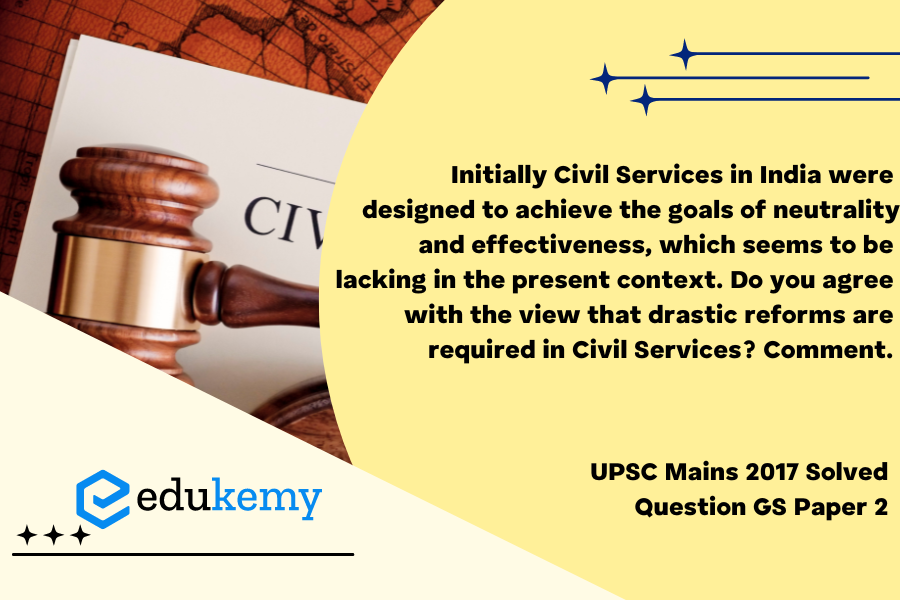The inception of Civil Services in India was marked by a visionary intent to establish a bureaucracy that would operate with unwavering neutrality and unparalleled effectiveness in serving the nation. Over the years, however, the landscape has undergone significant transformations, raising questions about the contemporary relevance of the Civil Services in fulfilling their originally envisaged objectives. The prevailing sentiment among many observers is that the current state of Civil Services falls short of the ideals that shaped its formation. The need for drastic reforms is increasingly perceived as imperative to address the apparent deviations from the foundational principles of neutrality and effectiveness. While the Civil Services have undoubtedly played a pivotal role in India’s governance structure, various challenges such as bureaucratic red tape, political interference, and systemic inefficiencies have emerged, leading to a growing consensus on the necessity for comprehensive reforms. This essay explores the nuances of this debate, examining the arguments both in favor of and against the proposition that drastic reforms are indispensable for reinvigorating the Civil Services in India.
Tag: Governance.
Contents
Decoding the Question:
- In the Introduction, try to briefly write about the Civil Services and its goal.
- In Body,
- Mention various issues in the present Civil Services.
- Suggest some reforms that are required in Civil Services.
- In Conclusion, try to write about the relevance of the Civil Services.
Answer:
The civil service in India, regarded as the ‘steel frame’ of administration, is today battling against onslaughts to its relevance. As the primary arm of government, the civil services must reform to keep pace with the changing times to meet the aspirations of the people.NITI Aayog in a landmark 2018 report, The Strategy for New India @ 75, stressed the need for reforms to ensure more effective and efficient delivery of public services to achieve the development goals.
The Issues in Civil Services:
- According to the Baswan Committee Report (2016), there is a shortage of personnel in the middle and higher levels of service, which leads to delays in service and a burden on existing staff.
- Career-based civil services coupled with excessive job security have led to a sense of complacency and lack of accountability amongst civil servants.
- Goal displacement due to emphasis on rules rather than results – with rules becoming an end in themselves.
- The current system of training for the civil services does not adequately reflect changes in the socio-economic scenario and the emerging new challenges render conventional approaches and practices of administration obsolete and dysfunctional.
- The ivory-tower approach of civil servants due to disconnect from ground realities is reflected in their ineffective policy making. There is a marked lack of a citizen-centric approach which is essential to understanding and redressing the problems of the poor and the weaker sections.
- Lack of stability of tenure due to the government’s inherent right to transfer a civil servant prevents the incumbent from learning on the job, developing his/her capacity, and then contributing in the best possible manner.
- Political interference in the form of arbitrary and whimsical transfers to ensure administrative acquiescence prevents the civil servant from acting neutrally.
- The promise of post-retirement appointments to statutory commissions, quasi-judicial tribunals, constitutional authorities, or contesting election for a political office on the ticket of a political party prevents the civil servant from acting impartially.
- Promotions hinge on several factors such as patronage versus merit.

Required Reforms in Civil Services:
- The mid-career training should be conducted to develop the domain of knowledge and competence required.
- A National Institute of Good Governance can be set up by upgrading one of the existing institutes, to identify, document, and disseminate best practices and also conduct training programmes.
- Aptitude and leadership tests should be introduced for selection, after the commencement of training to exercise their option for Services.
- There should be rationalization and harmonization of services, to reduce the number of separate services.
- The use of information and communication technologies (ICT) to transform Government by making it more accessible, effective, and accountable.
- There should be a system of performance assessment in which greater emphasis is placed on objective assessment against agreed work plans.
- Employment on contract basis should be encouraged and Government employees should have the right to retain their lien for two years in case they wish to migrate to the private sector.
- Domain assignment should be introduced for civil servants to encourage acquisition of skills, professional excellence, and career planning.
- An impartial Civil Services Board should be established to look after all the aspects related to promotions, transfers, posting, and suspensions.
- Strengthening and streamlining reporting mechanisms, fast-tracking departmental inquiries, linking performance with incentives, and overhauling employee grievance procedures to ensure accountability.
A well-functioning Civil Service has a crucial role in Good Governance and the formation of a New India. It must keep pace with the changing times to meet the aspirations of the people. Initiatives like Mission Karmayogi, etc., shifted the focus from Rule-based working to Role-based working. The implementation of recommendations of the 2nd ARC, Hota Committee report, etc., can further bring transformational changes in the Civil service capacity. Therefore, the purpose of ‘reform’ is to reorient the civil services into a dynamic, efficient, and accountable apparatus for public service delivery built on the ethos and values of impartiality, neutrality, and effectiveness. Holistic reforms are needed, cutting across dimensions of training (domain competence), promotion (performance related), tenure (stable), and interface with citizens (sensitivity training), etc.
In case you still have your doubts, contact us on 9811333901.
For UPSC Prelims Resources, Click here
For Daily Updates and Study Material:
Join our Telegram Channel – Edukemy for IAS
- 1. Learn through Videos – here
- 2. Be Exam Ready by Practicing Daily MCQs – here
- 3. Daily Newsletter – Get all your Current Affairs Covered – here
- 4. Mains Answer Writing Practice – here


